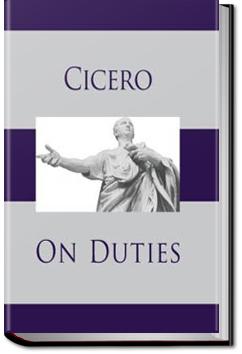UNLIMITED Audiobooks and eBooks
Over 40,000 books & works on all major devices
Get ALL YOU CAN for FREE for 30 days!
De Officiis - On Duties
Marcus Tullius Cicero
Book Overview:
On Duties (Latin: DE OFFICIIS) discusses virtue, expediency and apparent conflicts between the two. St. Ambrose, St. Jerome and other Doctors of the Roman Catholic Church considered it to be legitimate for study. It was the second book after the Bible printed on Gutenberg's press and a standard text taught at Eton College.
On Duties (Latin: DE OFFICIIS) discusses virtue, expediency and apparent conflicts between the two. St. Ambrose, St. Jerome and other Doctors of the Roman Catholic Church considered it to be legitimate for study. It was the second book after the Bible printed on Gutenberg's press and a standard text taught at Eton College.
How does All You Can Books work?
All You Can Books gives you UNLIMITED access to over 40,000 Audiobooks, eBooks, and Foreign Language courses. Download as many audiobooks, ebooks, language audio courses, and language e-workbooks as you want during the FREE trial and it's all yours to keep even if you cancel during the FREE trial. The service works on any major device including computers, smartphones, music players, e-readers, and tablets. You can try the service for FREE for 30 days then it's just $19.99 per month after that. So for the price everyone else charges for just 1 book, we offer you UNLIMITED audio books, e-books and language courses to download and enjoy as you please. No restrictions.
XXI. Quare cum hoc commune sit potentiae cupidorum cum iis, quos dixi, otiosis, alteri se adipisci id posse arbitrantur, si opes magnas habeant, alte. . . Read More
Try now for FREE!

"Love your service - thanks so much for what you do!"
- Customer Cathryn Mazer
"I did not realize that you would have so many audio books I would enjoy"
- Customer Sharon Morrison
"For all my fellow Audio Book & E-Book regulars:
This is about as close to nirvana as I have found!"
- Twitter post from @bobbyekat



Community Reviews
On Obligations (De officiis) was written in 44 BC, shortly after Caesar’s assassination and shortly before Cicero’s own. Cicero discusses the nature of the honorable, our obligation to pursue the honorable through the exercise of four cardinal virtues (wisdom, justice, beneficence, and magnanimity),
This book was written shortly after Caesar’s assassination in 44 B.C., and was heavily influenced by the Stoic school of philosophy. It could be said that this is a more historical than theoretical book, which makes it more practical in the light of daily experiences in a more direct way than other
Cicero's book is intelligent and charming, though his usual--how can I put this?--hatred of poor people does dull through the brilliance. But you shouldn't really need a goodreads review to convince you to read this book, which is tremendously important for the history of ideas Europe.
You might nee
Originally written for his son Marcus, this treatise expounds principles for a honorable life. The three books deal with 1) what is honorable, 2) what is useful and 3) what to do when the honorable "conflicts" with the useful.
In the end, Cicero argues that that which is honorable is also useful and
I have to admit, I'm not so great with reading the philosophers but when I started reading this book from the library, I realized I had to go out and buy my own edition so I could mark it up to my heart's content!! I didn't "learn" anything new as the values and ethics espoused in this treatise are
“Cicero, like thoughtful men of every age, knew that the reason vicious leaders like Caesar could rise to power was because the Roman population itself had been corrupted and no longer pursued the old virtues; a leader is, after all, a mirror of the people who choose him or at least allow him to ret